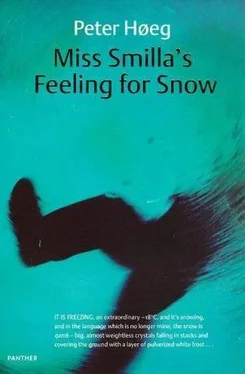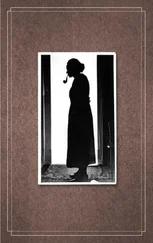Peter Høeg - Smilla's Sense of Snow aka Miss Smilla's Feeling for Snow
Здесь есть возможность читать онлайн «Peter Høeg - Smilla's Sense of Snow aka Miss Smilla's Feeling for Snow» весь текст электронной книги совершенно бесплатно (целиком полную версию без сокращений). В некоторых случаях можно слушать аудио, скачать через торрент в формате fb2 и присутствует краткое содержание. Жанр: Современная проза, на английском языке. Описание произведения, (предисловие) а так же отзывы посетителей доступны на портале библиотеки ЛибКат.
- Название:Smilla's Sense of Snow aka Miss Smilla's Feeling for Snow
- Автор:
- Жанр:
- Год:неизвестен
- ISBN:нет данных
- Рейтинг книги:3 / 5. Голосов: 1
-
Избранное:Добавить в избранное
- Отзывы:
-
Ваша оценка:
- 60
- 1
- 2
- 3
- 4
- 5
Smilla's Sense of Snow aka Miss Smilla's Feeling for Snow: краткое содержание, описание и аннотация
Предлагаем к чтению аннотацию, описание, краткое содержание или предисловие (зависит от того, что написал сам автор книги «Smilla's Sense of Snow aka Miss Smilla's Feeling for Snow»). Если вы не нашли необходимую информацию о книге — напишите в комментариях, мы постараемся отыскать её.
Smilla's Sense of Snow aka Miss Smilla's Feeling for Snow — читать онлайн бесплатно полную книгу (весь текст) целиком
Ниже представлен текст книги, разбитый по страницам. Система сохранения места последней прочитанной страницы, позволяет с удобством читать онлайн бесплатно книгу «Smilla's Sense of Snow aka Miss Smilla's Feeling for Snow», без необходимости каждый раз заново искать на чём Вы остановились. Поставьте закладку, и сможете в любой момент перейти на страницу, на которой закончили чтение.
Интервал:
Закладка:
He takes out a cellophane-wrapped cigar from his breast pocket.
"You're not allowed to smoke in here," says Benja. He gives her a preoccupied look. Then he gently taps the photo with the cigar.
"But in '66 they had to take pictures. There was some doubt about identification. They were severely maimed by the explosion. There was nothing to do but take X-rays. To look for old bone fractures and the like. The negatives were supposedly sent around to all the doctors in Greenland. Along with a full dental shot of what was left of their teeth."
It's not until now that I realize there are no thighbones beneath the pelvis in the X-ray.
Lagermann carefully places two more negatives next to the first one. In one of them almost the entire spine is intact. The other is a chaos of bone fragments and dark shadows, a pulverized universe.
"These prompt various professional questions. Such as the location of the bodies in relation to the detonation. It looks as if they were sitting right on top of the charge. That it was not-as is normal when you use plastic explosives on rock or ice-placed in a bored-out channel, or kneaded to an upside-down can, which concentrates the explosion in one particular spot. It practically blew up right under their ass, so to speak. Which rarely happens when professionals are involved."
"I'm leaving," says Benja. But she stays in her chair. "All of this is speculation based on very little evidence, of course. But this isn't."
He hangs up two larger X-rays under the first ones. "Enlargements from the negative of these areas."
He points with the cigar. "You can see the remains of the liver, the lower esophagus, and the stomach. The bottom rib has gotten stuck here, right above the vertebra lumbalis, which is here. This is the heart. Here it's damaged, there it's intact. Do you notice anything?"
To me it seems a chaos of black and gray nuances. Moritz leans forward. Curiosity wins out over vanity. From his inside pocket he takes out the glasses which only we, the women in his life, have ever seen him wear. Then he puts a fingernail on each picture.
"There."
Lagermann straightens up.
"Yes," he says, "that's the spot. But what the hell is it?"
Moritz picks up a magnifying glass from an aluminum tray. Even when he points it out, I don't understand. Only when he shows it to me on the second negative can I make it out. Just like in glaciology. One occurrence is an accident. It's the repeat occurrence that creates a structure.
It's a needle-thin, whitish line, uneven, crooked. It wanders up along the smashed vertebrae, disappears at the ribs, reappears at the tip of one lung, vanishes, and shows up again near the heart, outside and partly inside of it, in the large ventricle, like a white thread of light.
Lagermann points at the second X-ray. Through the liver, into the left kidney.
They stare through the magnifying glass.
Then Moritz turns around. He picks up a shiny, thick journal from his desk.
"Nature," he says. "A special issue from 1979. Which you, Smilla, directed my attention to."
There's a photograph on the right-hand side. An X-ray photo, but using a technique that makes the soft organs visible, too, so that the body almost imperceptibly merges into the skeleton.
"This," says Moritz, "is a man from Ghana."
He points with his fountain pen along the left side of the photograph. There is a light winding line moving from one hip up through the abdominal cavity.
"Dracunculus," he says. "Guinea worm. Transmitted via Cyclops water fleas, in the drinking water. Can also bore its way through the skin. A truly nasty parasite. Up to three feet long. Works its way through the body with a speed of up to half an inch a day. Finally sticks its head out through the thigh. That's where the Africans catch it and roll it up around a stick. Every day they wind up a few more inches. It takes a month to get it out. That month and the months before are one continuous period of suffering."
"That's gross," says Benja.
We put our heads up close to the X-rays.
"I thought so," says Lagermann. "I thought it must be some kind of worm."
"The article in Nature," says Moritz, "is about diagnosing this sort of parasite by X-ray. It's quite complicated if it's not calcified in the tissue. Because the heart is no longer beating, it's very difficult to make the contrast fluids disseminate through the body."
"But this is about Greenland," I say. "Not the tropics." Moritz nods.
"But you had underlined the article in your letter. Loyen wrote it. It's one of his main specialties." Lagermann taps on the negative. "I don't know anything about tropical diseases. I'm a forensics specialist. But something has bored its way into these two people. Something that might be a worm or might be something else. Something that has left a channel sixteen inches long and at least two millimeters in diameter. Straight through the diaphragm and the soft organs. Something that stops in areas exploded by infection. For these two gentlemen the TNT didn't make any difference. They were already dead. They died because something-whatever the hell it was-had stuck its head into the heart of one man and the liver of the other."
We stare at the X-rays in bewilderment.
"The right man to solve this problem," says Moritz, "might be Loyen."
Lagermann regards him with his eyes narrowed. "Yes," he says, "it would be interesting to hear what he has to say. But if we wanted to be sure of an honest answer, it looks as if we'd have to tie him to a chair, give him sodium pentothal, and hook him up to a lie detector."
6
I would like to understand Benja. At this moment more than ever.
It wasn't always this way. I didn't always have to understand things. At least I tell myself that it wasn't always this way. When I came to Denmark for the first time, I experienced phenomena. In all their gruesomeness, or beauty, or gray drabness. But without feeling any great need to explain them.
Often there was no food when Isaiah came home. Juliane would be sitting at the table with her friends, and there were cigarettes and laughter and tears and an enormous abuse of alcohol, but there wasn't as much as five kroner to go out and buy some French fries. He never complained. He never yelled at his mother. He never sulked. Patient, silent, and watchful he would wrench himself away from the outstretched hands and go on his way. In order to find, if possible, some other solution. Sometimes the mechanic was home, sometimes I was. He could sit in my living room for an hour or more without telling me he was hungry. Persisting in an extreme, almost stupid, Greenlandic politeness.
Occasionally I would feel the urge to explain things after I had cooked for him, after I had boiled a mackerel and put the whole fish, weighing three pounds, on the floor on a newspaper because that's where he preferred to eat. Without uttering a word, using both hands, he would devour the entire fish with methodical thoroughness and eat the eyes and suck out the brain and lick the backbone and crunch on the fins. I would try to understand the difference between growing up in Denmark and growing up in Greenland. To comprehend the humiliating, exhausting, monotonous emotional dramas with which European children and parents are bound together in mutuaI hatred and dependence. And to understand Isaiah.
Deep inside I know that trying to figure things out leads to blindness, that the desire to understand has a buiIt-in brutality that erases what you seek to comprehend. Only experience is sensitive. But maybe I'm both weak and brutal. I've never been able to resist trying.
Benja seems to have been given everything. I've met her parents. They're trim and subdued and play the piano and speak foreign languages, and every year, when the Royal Theater's school closed for the summer and they went south to their house on the Costa Smeralda, they aways took the best French ballet tutor along to badger Benja on the terrace between the palm trees every morning, because that's what she herself wanted.
Читать дальшеИнтервал:
Закладка:
Похожие книги на «Smilla's Sense of Snow aka Miss Smilla's Feeling for Snow»
Представляем Вашему вниманию похожие книги на «Smilla's Sense of Snow aka Miss Smilla's Feeling for Snow» списком для выбора. Мы отобрали схожую по названию и смыслу литературу в надежде предоставить читателям больше вариантов отыскать новые, интересные, ещё непрочитанные произведения.
Обсуждение, отзывы о книге «Smilla's Sense of Snow aka Miss Smilla's Feeling for Snow» и просто собственные мнения читателей. Оставьте ваши комментарии, напишите, что Вы думаете о произведении, его смысле или главных героях. Укажите что конкретно понравилось, а что нет, и почему Вы так считаете.




![Рута Шепетис - Ashes in the Snow [aka Between Shades of Gray]](/books/414915/ruta-shepetis-ashes-in-the-snow-aka-between-shades-thumb.webp)







